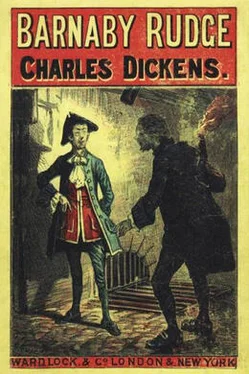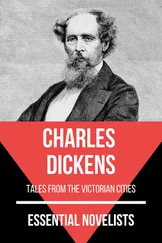Towards this young gentleman the eyes of Mr Willet wandered but once, and then as if in mute inquiry whether he had observed his silent neighbour. It was plain that John and the young gentleman had often met before. Finding that his look was not returned, or indeed observed by the person to whom it was addressed, John gradually concentrated the whole power of his eyes into one focus, and brought it to bear upon the man in the flapped hat, at whom he came to stare in course of time with an intensity so remarkable, that it affected his fireside cronies, who all, as with one accord, took their pipes from their lips, and stared with open mouths at the stranger likewise.
The sturdy landlord had a large pair of dull fish–like eyes, and the little man who had hazarded the remark about the moon (and who was the parish–clerk and bell–ringer of Chigwell, a village hard by) had little round black shiny eyes like beads; moreover this little man wore at the knees of his rusty black breeches, and on his rusty black coat, and all down his long flapped waistcoat, little queer buttons like nothing except his eyes; but so like them, that as they twinkled and glistened in the light of the fire, which shone too in his bright shoe–buckles, he seemed all eyes from head to foot, and to be gazing with every one of them at the unknown customer. No wonder that a man should grow restless under such an inspection as this, to say nothing of the eyes belonging to short Tom Cobb the general chandler and post–office keeper, and long Phil Parkes the ranger, both of whom, infected by the example of their companions, regarded him of the flapped hat no less attentively.
The stranger became restless; perhaps from being exposed to this raking fire of eyes, perhaps from the nature of his previous meditations—most probably from the latter cause, for as he changed his position and looked hastily round, he started to find himself the object of such keen regard, and darted an angry and suspicious glance at the fireside group. It had the effect of immediately diverting all eyes to the chimney, except those of John Willet, who finding himself as it were, caught in the fact, and not being (as has been already observed) of a very ready nature, remained staring at his guest in a particularly awkward and disconcerted manner.
'Well?' said the stranger.
Well. There was not much in well. It was not a long speech. 'I thought you gave an order,' said the landlord, after a pause of two or three minutes for consideration.
The stranger took off his hat, and disclosed the hard features of a man of sixty or thereabouts, much weatherbeaten and worn by time, and the naturally harsh expression of which was not improved by a dark handkerchief which was bound tightly round his head, and, while it served the purpose of a wig, shaded his forehead, and almost hid his eyebrows. If it were intended to conceal or divert attention from a deep gash, now healed into an ugly seam, which when it was first inflicted must have laid bare his cheekbone, the object was but indifferently attained, for it could scarcely fail to be noted at a glance. His complexion was of a cadaverous hue, and he had a grizzly jagged beard of some three weeks' date. Such was the figure (very meanly and poorly clad) that now rose from the seat, and stalking across the room sat down in a corner of the chimney, which the politeness or fears of the little clerk very readily assigned to him.
'A highwayman!' whispered Tom Cobb to Parkes the ranger.
'Do you suppose highwaymen don't dress handsomer than that?' replied Parkes. 'It's a better business than you think for, Tom, and highwaymen don't need or use to be shabby, take my word for it.'
Meanwhile the subject of their speculations had done due honour to the house by calling for some drink, which was promptly supplied by the landlord's son Joe, a broad–shouldered strapping young fellow of twenty, whom it pleased his father still to consider a little boy, and to treat accordingly. Stretching out his hands to warm them by the blazing fire, the man turned his head towards the company, and after running his eye sharply over them, said in a voice well suited to his appearance:
'What house is that which stands a mile or so from here?'
'Public–house?' said the landlord, with his usual deliberation.
'Public–house, father!' exclaimed Joe, 'where's the public–house within a mile or so of the Maypole? He means the great house—the Warren—naturally and of course. The old red brick house, sir, that stands in its own grounds—?'
'Aye,' said the stranger.
'And that fifteen or twenty years ago stood in a park five times as broad, which with other and richer property has bit by bit changed hands and dwindled away—more's the pity!' pursued the young man.
'Maybe,' was the reply. 'But my question related to the owner. What it has been I don't care to know, and what it is I can see for myself.'
The heir–apparent to the Maypole pressed his finger on his lips, and glancing at the young gentleman already noticed, who had changed his attitude when the house was first mentioned, replied in a lower tone:
'The owner's name is Haredale, Mr Geoffrey Haredale, and'—again he glanced in the same direction as before—'and a worthy gentleman too—hem!'
Paying as little regard to this admonitory cough, as to the significant gesture that had preceded it, the stranger pursued his questioning.
'I turned out of my way coming here, and took the footpath that crosses the grounds. Who was the young lady that I saw entering a carriage? His daughter?'
'Why, how should I know, honest man?' replied Joe, contriving in the course of some arrangements about the hearth, to advance close to his questioner and pluck him by the sleeve, 'I didn't see the young lady, you know. Whew! There's the wind again—AND rain—well it IS a night!'
Rough weather indeed!' observed the strange man.
'You're used to it?' said Joe, catching at anything which seemed to promise a diversion of the subject.
'Pretty well,' returned the other. 'About the young lady—has Mr Haredale a daughter?'
'No, no,' said the young fellow fretfully, 'he's a single gentleman—he's—be quiet, can't you, man? Don't you see this talk is not relished yonder?'
Regardless of this whispered remonstrance, and affecting not to hear it, his tormentor provokingly continued:
'Single men have had daughters before now. Perhaps she may be his daughter, though he is not married.'
'What do you mean?' said Joe, adding in an undertone as he approached him again, 'You'll come in for it presently, I know you will!'
'I mean no harm'—returned the traveller boldly, 'and have said none that I know of. I ask a few questions—as any stranger may, and not unnaturally—about the inmates of a remarkable house in a neighbourhood which is new to me, and you are as aghast and disturbed as if I were talking treason against King George. Perhaps you can tell me why, sir, for (as I say) I am a stranger, and this is Greek to me?'
The latter observation was addressed to the obvious cause of Joe Willet's discomposure, who had risen and was adjusting his riding–cloak preparatory to sallying abroad. Briefly replying that he could give him no information, the young man beckoned to Joe, and handing him a piece of money in payment of his reckoning, hurried out attended by young Willet himself, who taking up a candle followed to light him to the house–door.
While Joe was absent on this errand, the elder Willet and his three companions continued to smoke with profound gravity, and in a deep silence, each having his eyes fixed on a huge copper boiler that was suspended over the fire. After some time John Willet slowly shook his head, and thereupon his friends slowly shook theirs; but no man withdrew his eyes from the boiler, or altered the solemn expression of his countenance in the slightest degree.
Читать дальше












